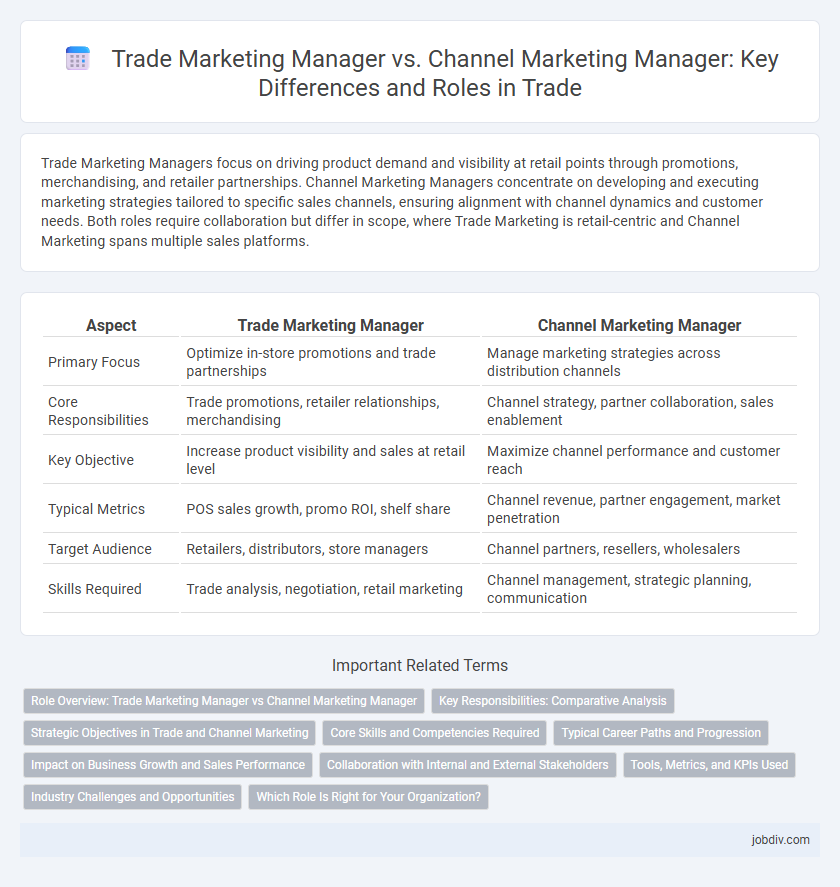Trade Marketing Managers focus on driving product demand and visibility at retail points through promotions, merchandising, and retailer partnerships. Channel Marketing Managers concentrate on developing and executing marketing strategies tailored to specific sales channels, ensuring alignment with channel dynamics and customer needs. Both roles require collaboration but differ in scope, where Trade Marketing is retail-centric and Channel Marketing spans multiple sales platforms.
Table of Comparison
| Aspect | Trade Marketing Manager | Channel Marketing Manager |
|---|---|---|
| Primary Focus | Optimize in-store promotions and trade partnerships | Manage marketing strategies across distribution channels |
| Core Responsibilities | Trade promotions, retailer relationships, merchandising | Channel strategy, partner collaboration, sales enablement |
| Key Objective | Increase product visibility and sales at retail level | Maximize channel performance and customer reach |
| Typical Metrics | POS sales growth, promo ROI, shelf share | Channel revenue, partner engagement, market penetration |
| Target Audience | Retailers, distributors, store managers | Channel partners, resellers, wholesalers |
| Skills Required | Trade analysis, negotiation, retail marketing | Channel management, strategic planning, communication |
Role Overview: Trade Marketing Manager vs Channel Marketing Manager
Trade Marketing Managers focus on developing and executing in-store promotions, merchandising strategies, and sales support initiatives to drive product visibility and consumer demand within retail environments. Channel Marketing Managers specialize in creating tailored marketing plans for specific distribution channels, managing partner relationships, and optimizing channel performance to increase market penetration and revenue. Both roles require strong collaboration with sales teams but differ in scope, with Trade Marketing centered on point-of-sale impact and Channel Marketing emphasizing broader channel strategy and partner management.
Key Responsibilities: Comparative Analysis
A Trade Marketing Manager focuses on driving product demand and increasing sales through in-store promotions, point-of-sale materials, and retail partnerships, ensuring product visibility and execution at the retail level. In contrast, a Channel Marketing Manager oversees marketing strategies across various distribution channels, optimizing channel performance by tailoring campaigns to specific channel needs such as online, wholesale, or direct sales. Both roles contribute to revenue growth but differ in scope: Trade Marketing prioritizes retailer engagement and in-store execution, while Channel Marketing manages broader channel strategy and multi-channel integration.
Strategic Objectives in Trade and Channel Marketing
Trade Marketing Managers focus on driving in-store visibility, promotions, and sales growth by implementing targeted retail strategies to optimize product placement and consumer engagement at the point of sale. Channel Marketing Managers prioritize developing and managing relationships across multiple distribution channels, aligning marketing efforts to maximize channel partner performance and market coverage. Both roles strategically aim to increase market share and revenue, with Trade Marketing concentrating on retailer-focused activities and Channel Marketing emphasizing broader channel development and collaboration.
Core Skills and Competencies Required
Trade Marketing Managers excel in demand generation, in-store promotions, and retail execution, requiring strong analytical skills and customer-focused strategies. Channel Marketing Managers specialize in developing partner relationships, managing multi-channel campaigns, and optimizing channel sales performance, demanding expertise in communication and channel management. Both roles require proficiency in market analysis, KPI tracking, and cross-functional collaboration to drive revenue growth.
Typical Career Paths and Progression
Trade Marketing Managers often advance from roles in sales, merchandising, or brand management, gaining expertise in retail strategies and consumer behavior before moving into senior trade or category management positions. Channel Marketing Managers typically progress through digital marketing, sales enablement, or partner management roles, honing skills in multi-channel campaigns and distribution strategies, eventually advancing to director-level roles overseeing channel development. Both career paths emphasize increasing responsibility in market analysis, strategic planning, and cross-functional leadership within trade and distribution environments.
Impact on Business Growth and Sales Performance
Trade Marketing Managers drive business growth by optimizing in-store promotions and point-of-sale strategies, directly influencing consumer purchase decisions and increasing product visibility. Channel Marketing Managers enhance sales performance by developing tailored marketing campaigns for specific distribution channels, improving channel partner engagement and expanding market reach. Both roles synergize to boost revenue, with Trade Marketing focusing on shopper activation and Channel Marketing strengthening channel alignment and sales effectiveness.
Collaboration with Internal and External Stakeholders
Trade Marketing Managers optimize in-store promotions and collaborate closely with sales teams, retailers, and distributors to boost product visibility and sales performance. Channel Marketing Managers coordinate with digital platforms, wholesalers, and partner networks to tailor marketing campaigns specific to each distribution channel's characteristics. Effective collaboration with internal stakeholders such as product development, sales, and finance teams ensures alignment, while managing external relationships drives channel-specific strategies and maximizes market penetration.
Tools, Metrics, and KPIs Used
Trade Marketing Managers rely heavily on tools like shopper marketing platforms, retail analytics software, and point-of-sale (POS) data systems to optimize in-store promotions and merchandising effectiveness. Channel Marketing Managers utilize CRM systems, marketing automation tools, and channel attribution models to track partner engagement and campaign impact across multiple distribution channels. Key metrics for Trade Marketing include shelf share, in-store activation rates, and sales lift, while Channel Marketing focuses on partner ROI, lead conversion rates, and channel sales growth.
Industry Challenges and Opportunities
Trade Marketing Managers face challenges in aligning promotional activities with retail partners' objectives while maximizing in-store visibility and consumer engagement. Channel Marketing Managers must address complexities in managing multiple distribution channels, ensuring consistent messaging, and optimizing channel-specific strategies to drive sales growth. Both roles encounter opportunities in leveraging data analytics and digital tools to enhance targeted marketing campaigns and improve overall supply chain efficiency.
Which Role Is Right for Your Organization?
Trade Marketing Managers specialize in driving in-store promotions and optimizing point-of-sale strategies to boost product visibility and sales within retail environments. Channel Marketing Managers focus on developing and executing marketing campaigns tailored to specific distribution channels, enhancing brand presence and customer engagement across diverse platforms. Choosing the right role depends on your organization's focus: prioritize Trade Marketing Managers for retail-centric growth and Channel Marketing Managers for broader multi-channel strategy management.
Trade Marketing Manager vs Channel Marketing Manager Infographic

 jobdiv.com
jobdiv.com